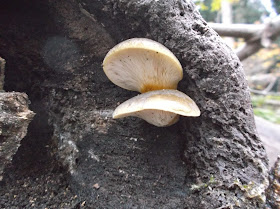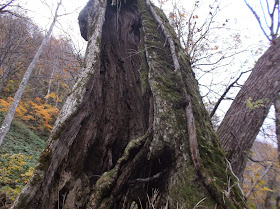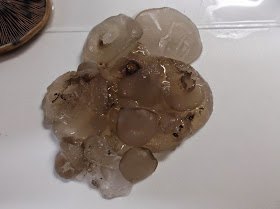Today (November 3), I went for another mushroom hunt, mainly because I wanted to see if I could find some shimofuri shimeji in a secret spot.
今日(11/3)、またきのこ狩りに行きました。主な理由は、秘密の場所にシモフリシメジがあるかどうか確認したかったことです。
Unfortunately, none.残念ながら、ありませんでした。
I headed for the trekking course immediately. In this tree,
すぐにトレッキングコースに向かいました。この木に、
I found some tiny kuritake.
小さなクリタケを見つけました。
I also found these hiding ones there.
また、この隠れているのも見つけました。
On this very big fallen log,
このとても大きな倒木に、
I found some mukitake! Hooray!
ムキタケを見つけました!やった!
Some were too old to eat.
老菌で食べられないのもありました。
Some were hiding.
隠れているのもありました。
On this very small fallen log,
この小さな倒木に、
I found nikawa chawan take (Neobulgaria pura).
ニカワチャワンタケを見つけました。
On this big fallen tree,
この大きな倒木に、
I found some mukitake and these small mushrooms.
ムキタケと、この小さなきのこを見つけました。
My son says they are enokitake. You will see that wild ones are completely different from the cultured.
息子によれば、エノキタケです。栽培品とはまったく異なることが分かると思います。
On this very large tree,
このとても大きな木に、
I found mukitake.ムキタケを見つけました。
It may be hard to see from the photos, but some of the mukitake are too high for me to reach.
写真では分かりにくいかもしれませんが、高過ぎて届かないのもあります。
I managed to get some of the tall ones by using a long fallen branch, but I had to give up the rest.
長い枝を使って、高いところのを少しは採れましたが、残りは諦めざるを得ませんでした。
This tree, viewed from a different angle.
違う角度から見たこの木。
Then, I went to mountain 2.
それから二番目の山に行きました。
I found one mysterious mushroom.
奇妙なきのこを一つ見つけました。
Even my son is unable to identify this one.
息子でさえ、このきのこを同定(特定)できません。
Late fall.
晩秋です。
I also found one poisonous mushroom.
毒きのこも一つ見つけました。
I picked it and put it in another plastic bag to show it to my son. He likes any mushrooms, edible or poisonous.
息子に見せるため、採って、別のレジ袋に入れました。息子はきのこなら、食べれるきのこ、毒きのこに関係なく好きなので。
Then, I went to a secret spot. Surprisingly, I found hatsutake! Not one but many!
次に秘密の場所に行きました。驚いたことに、ハツタケを見つけました。一つではなく、たくさんです。
It's strange, because hatsutake usually occur in late summer through early fall.
普通、ハツタケは晩夏から初秋にかけて発生するので、不思議です。
Then, I went to another secret spot. There I found hiratake (oyster mushrooms)!
それから別の秘密の場所に行きました。ヒラタケを見つけました。
Big ones suffered from the disease called "hiratake shiro kobu byou". I don't know the English name. These small white balls contain nematodes. Small fries called kinoko bae (Mycetophilidae) bring nematodes to oyster mushrooms, and the mushrooms protect themselves by confining the nematodes in these balls.
大きいのは、「ヒラタケ白こぶ病」という病気にかかっていました。英語名は知りません。小さな白いこぶには、線虫が入っています。キノコバエという小さなハエがヒラタケに線虫を持ち込み、ヒラタケは、その線虫をこのこぶに閉じ込めて自らを守ります。
Sadly, some were too old.
悲しいことに、老菌もありました。
*******************************
After I returned home, my son and I cleaned all the edible mushrooms, and the unidentified one (cut lengthwise in half).
帰宅してから、息子と一緒に、食べられるきのこと、同定できないきのこ(縦に半分にきってある)をきれいにしました。
The unidentified one went into the trash can later.
同定できないきのこは後でゴミ箱に入れました。
Hatsutake
ハツタケ
Enokitake
エノキタケ
My son says that one big feature is the blackish stem.
息子によれば、黒っぽい軸が大きな特徴の一つだそうです。
Nikawa chawan take
ニカワチャワンタケ
Sugi eda take
スギエダタケ
Kuritake
クリタケ
Hiratake (oyster mushrooms)
ヒラタケ
Mukitake
ムキタケ
I soaked them in a bowl of cold water, with the underside down, to remove the tiny insects.
小さな虫を追い出すため、裏側を下にして、冷水の入ったボールに漬けました。
You can see a relatively large one in the center of the photo.
比較的大きな虫が写真の中央に見えます。
I was unable to remove all the insects. To kill the remaining ones, I put the mukitake in a small bowl, and added hot water from the thermos.
虫を全部追い出せませんでした。残っている虫を殺すため、ムキタケを小さなボールに入れ、魔法瓶のお湯を注ぎました。
I wrapped the mukitake in bacon, and heated in the toaster oven for 10 minutes.
ムキタケはベーコンで巻き、オーブントースターで10分、加熱しました。
I put all other mushrooms, except the hiratake, in a container, added some hot water, microwaved for a short time, and we had them by putting them in clear soup.
ヒラタケ以外の残りのきのこは、容器に入れ、お湯を入れ、電子レンジで短時間加熱して、澄まし汁に入れて食べました。
Correction: I made foil yaki with the hatsutake.
訂正: ハツタケはホイル焼きにしました。
Tomorrow evening, I will make cream stew with the hiratake.
明日の夕方、ヒラタケでクリームシチューを作ります。




















































I need to stop looking at these before lunch. I'm so hungry now. But seriously congrats on the result of the mushroom hunt.
ReplyDeleteYubun: Photos of wild mushrooms make you hungry (laugh)?
ReplyDeleteI LOOOOOVVVEEEE wild mushroom. Really not many other food that can match the aroma of different types of wild mushroom. Pan fried maitake mushroom being one of my favorite.
ReplyDeleteThat is absolutely amazing! It all looks so delicious. How did you learn what are the edible mushrooms? Can you recommend a book (日本語でもいいよ)?
ReplyDeleteKyoto Kitchen: Hi, long time, no see!
ReplyDeleteI'm still learning, so is my son!
Nihon no Kinoko 日本のきのこ is the bible for many mushroom hunters in Japan, including us. The latest edition is quite expensive (more than 8,000 yen)! We have the previous edition of the book, which is around 4,000 yen. My son says that the previous edition is sufficient (the latest edition contains only minor changes, although the publisher claims that it's a full revision).
The first book on mushrooms we bought was キノコ狩りガイドブック, which we find very good for beginners.
Here is a photo of these and other books:
http://hiro-shio.blogspot.jp/2012/10/mushroom-hunting-on-october-281028.html
The first book is at the bottom left of the photo, the second is at the top left.
You can also learn a lot from online sources like this one:
http://www.kinoco-zukan.net/
Finally, someone knowledgeable about mushrooms is a must if you decided to go mushroom hunting.